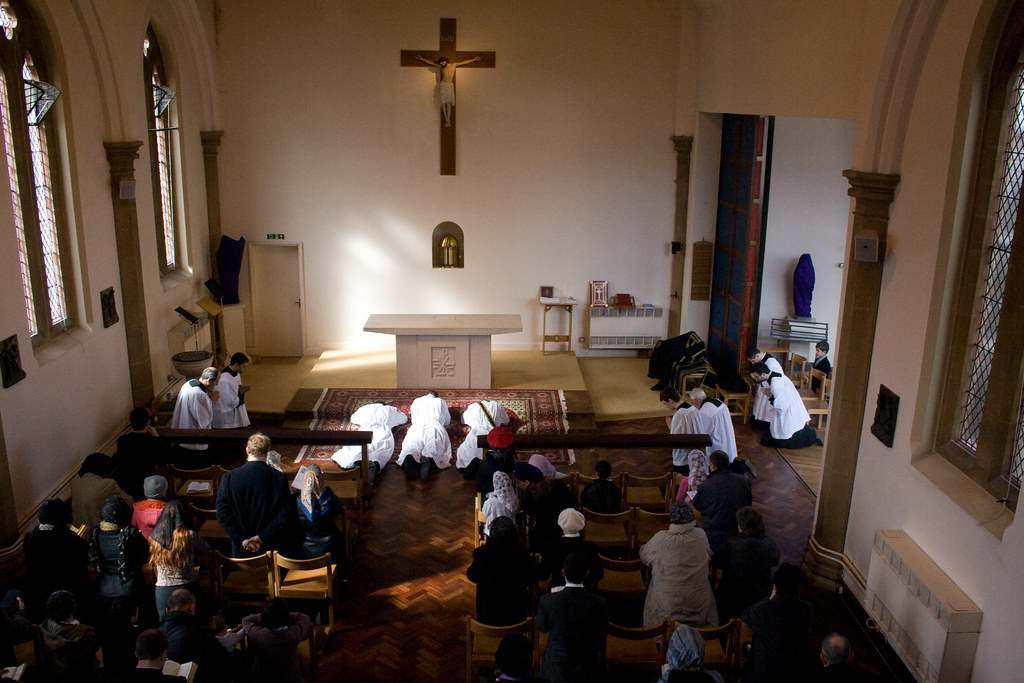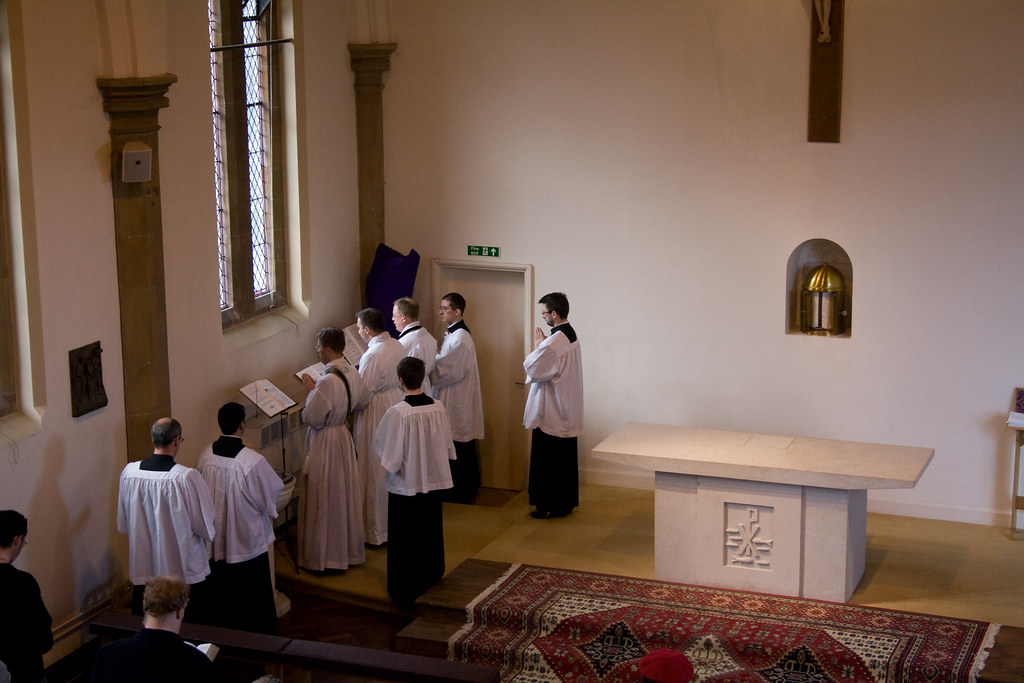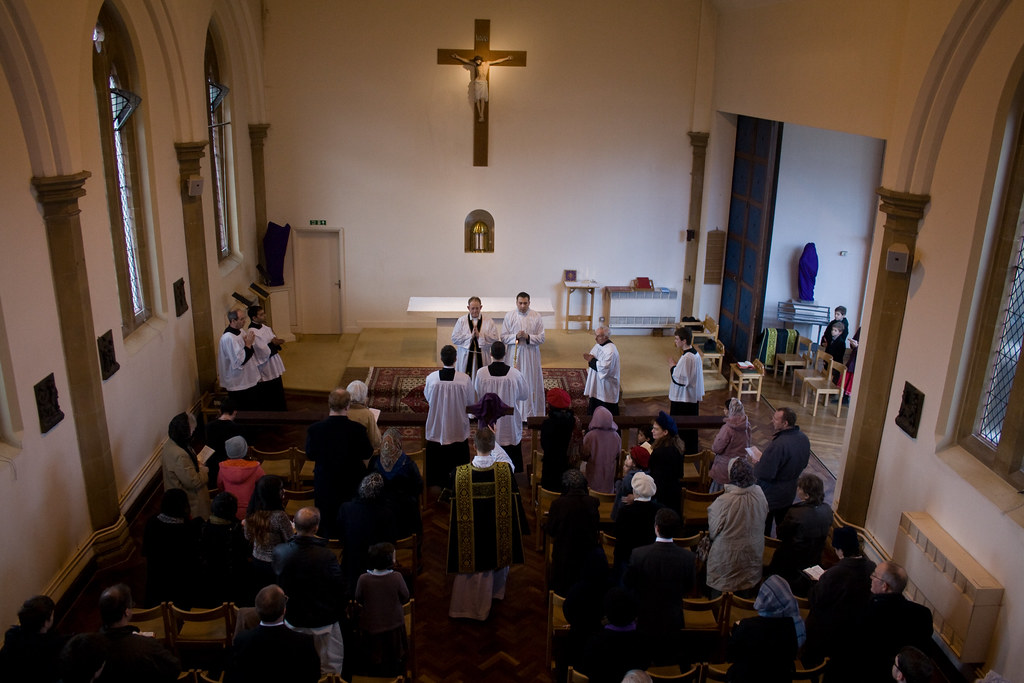Yesterday I had a brief live interview on BBC Radio Oxford with Louisa Hannan, on the subject of the Foreign Office memo about the Papal visit. I had prepared myself for some aggressive questioning but we had a very amicable chat, even when I drew the parallel with the leaked BBC memo of 2006 in which it was acknowledged that it would be acceptable for a television show guest to throw a Bible in a bin but not a Koran. You can hear the interview for a few more days here.
I pointed out that such a memo would never have been written about a non-Christian faith, and that far from being entirely a joke, it made clear that the authors had a problem with the Pope simply because he disagreed with current Government policy: on adoption, condoms, abortion and, interestingly enough, on the ordination of women. You can see the famous list in full here.
My interviewer asked me whether I thought that jokes about religions should be allowed at all. I was able to point out that it was the Government, opposed by Christian groups, which had tried to suppress criticism of religious beliefs and ways of life, in recent legislation. They clearly had Islam and homosexuality in mind: when it comes to Catholicism different rules come into play.
The Latin Mass Society is asked from time to time to provide people to give interviews; recently a Committee member was part of a television panel as a result. This is the third time I've been on the radio; on this occasion they got my name off a University list of people willing to talk to the press. I'm glad the Catholic Bishops of England and Wales have got a list of young people willing to talk to the press during the Papal visit, although I am concerned that the clumsy attempts by Austin Ivereigh to exclude 'controversial' figures have not only generated a lot of bad publicity, but will have left the list of 'Catholic Voices' looking rather bland. The list does rather give the impression of being a university CathSoc committee - a lot of theology graduate students, and few people with experience of the media, the hierarchy, or dealing in a practically way with the issues they are likely to be asked about. But if the media aren't impressed by them, they will simply go elsewhere for Catholics to talk to.
Labels
- Bishops
- Chant
- Children
- Clerical abuse
- Conservative critics of the EF
- Correctio Filialis
- FIUV Position Papers
- Fashion
- Freemasonry
- Historical and Liturgical Issues
- Islam
- Liberal critics of the EF
- Marriage & Divorce
- Masculinity
- New Age
- Patriarchy
- Pilgrimages
- Pope Francis
- Pro-Life
- Reform of the Reform
- Young people
Friday, April 30, 2010
Thursday, April 29, 2010
Why I won't be voting for David Cameron
[ Update: Fr John Boyle has posted in a similar vein here.]
Update: Fr John Boyle has posted in a similar vein here.]
I happen to live in the constituency of David Cameron, 'Witney'. It is a 'safe' seat, so he has nothing to fear from me, but I just thought I'd share this: h-t Peter Hitchens.
Paxman: "You're in favour of faith schools being able to teach sex education as they like". Cameron:"Not as they like. That's not right. What we voted for was what the government suggested in the end, which is proper sex education..." Paxman: "Should they be free to teach that homosexuality is wrong, abortion is wrong, contraception is wrong?" "No, and the government discussed this and came up with a good idea , which is to say that we wanted a clearer path of sexual education across all schools, but faith schools were not given any exemption but they were able to reflect some of their own faith in the way that this was taught. But no, you must teach proper lessons in terms of gay equality and also combat homophobic bullying in schools, I think that's extremely important."
The Latin Mass Society, I'm glad to say, has always attracted people from accross the political spectrum. One early supporter was the founder of the Welsh Nationalist party; a founding member, the convert Hugh Ross Williamson, was once deselected as a Labour candidate for being too left-wing. My involvement in party politics, in the past, was with the Tories: I canvassed for them in the 1987 election, while I was still at school, and was a party member for a few years after that.
But I won't be voting for Dave on 6th May. He clearly doesn't believe in the right of parents to bring up their children according to their beliefs (a right enshrined in international law, for what it is worth), and regards the beliefs of Catholics with contempt, indeed as worthy of legal suppression. I hope that all Catholics consider the views of their local candidates with care, and that whatever party ends up dominating the House of Commons there are more MPs there who will support the right of Catholics simply to live in accordance with their religion. It's not much to ask: just let us exist!
 Update: Fr John Boyle has posted in a similar vein here.]
Update: Fr John Boyle has posted in a similar vein here.]I happen to live in the constituency of David Cameron, 'Witney'. It is a 'safe' seat, so he has nothing to fear from me, but I just thought I'd share this: h-t Peter Hitchens.
Paxman: "You're in favour of faith schools being able to teach sex education as they like". Cameron:"Not as they like. That's not right. What we voted for was what the government suggested in the end, which is proper sex education..." Paxman: "Should they be free to teach that homosexuality is wrong, abortion is wrong, contraception is wrong?" "No, and the government discussed this and came up with a good idea , which is to say that we wanted a clearer path of sexual education across all schools, but faith schools were not given any exemption but they were able to reflect some of their own faith in the way that this was taught. But no, you must teach proper lessons in terms of gay equality and also combat homophobic bullying in schools, I think that's extremely important."
The Latin Mass Society, I'm glad to say, has always attracted people from accross the political spectrum. One early supporter was the founder of the Welsh Nationalist party; a founding member, the convert Hugh Ross Williamson, was once deselected as a Labour candidate for being too left-wing. My involvement in party politics, in the past, was with the Tories: I canvassed for them in the 1987 election, while I was still at school, and was a party member for a few years after that.
But I won't be voting for Dave on 6th May. He clearly doesn't believe in the right of parents to bring up their children according to their beliefs (a right enshrined in international law, for what it is worth), and regards the beliefs of Catholics with contempt, indeed as worthy of legal suppression. I hope that all Catholics consider the views of their local candidates with care, and that whatever party ends up dominating the House of Commons there are more MPs there who will support the right of Catholics simply to live in accordance with their religion. It's not much to ask: just let us exist!
Wednesday, April 28, 2010
Polyphonic Mass at St Birinus for the Ascension of Our Lord
Another in the series of polyphonic Masses in St Birinus, directed by Andrew Knowles.
And when I say 'polyphonic', Andrew has found polyphonic settings even for the propers of the Mass. This is a unique glimpse into what the liturgy must have looked like in many places before the revival of Greogorian Chant in the late 19th Century.
And when I say 'polyphonic', Andrew has found polyphonic settings even for the propers of the Mass. This is a unique glimpse into what the liturgy must have looked like in many places before the revival of Greogorian Chant in the late 19th Century.
Extraordinary Rite Celebration of
High Mass for the Solemnity of the
Ascension of Our Lord and
Saviour Jesus Christ
St Birinus’ Roman Catholic Church
Dorchester-upon-Thames
Thursday 13th May 2010
7.30 pm
This Mass will feature soprano, alto, tenor and bass soloists accompanied by two violins and organ in
Franz Schubert’s
Missa in G (D. 167)
Introit
In conspectus angelorum Georg F. Wolf 1761-1814
Offertory
Benedictus Deus et Pater Samuel S. Wesley 1810-1876
Communion
Laudate Dominum W. A. Mozart 1756-1791
Sortie
Regina Caeli Laetare Ferdinand Schubert 1794-1859
Music directed by Andrew Knowles MA FRCO
Sunday Mass at SS Gregory & Augustine's, Oxford

A very happy parish Mass at SS Gregory & Augustine's last Sunday at 10.30am.
The parish choir was supported by the Schola Abelis for the occasion.
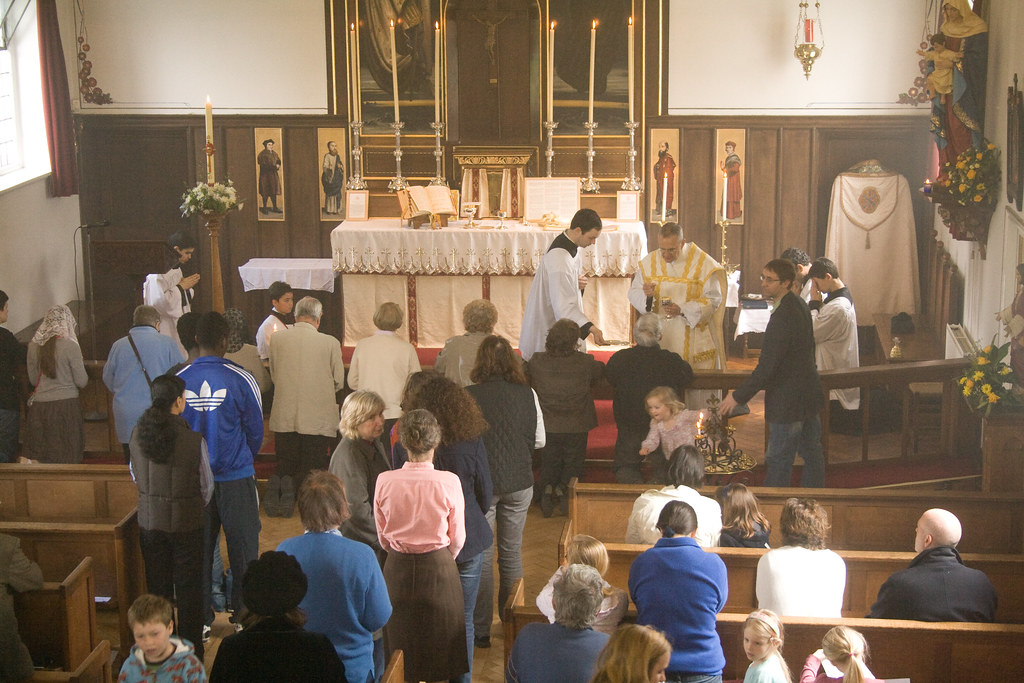
A few more photos here.
Tuesday, April 27, 2010
Prinknash Abbey
 I managed to post a little photo of the Mass at Prinknash Abbey I attended on Saturday, from my IPhone; here are some (slightly) better ones, though the lighting was difficult. Mass was said for us by Fr Mark Hargreaves; there is Low Mass every Saturday at 11am, and on the first Sunday of each month at 3pm. Mass takes place in the monastery chapel, which has a special transept for visitors, who observe the liturgy from the Gospel side.
I managed to post a little photo of the Mass at Prinknash Abbey I attended on Saturday, from my IPhone; here are some (slightly) better ones, though the lighting was difficult. Mass was said for us by Fr Mark Hargreaves; there is Low Mass every Saturday at 11am, and on the first Sunday of each month at 3pm. Mass takes place in the monastery chapel, which has a special transept for visitors, who observe the liturgy from the Gospel side.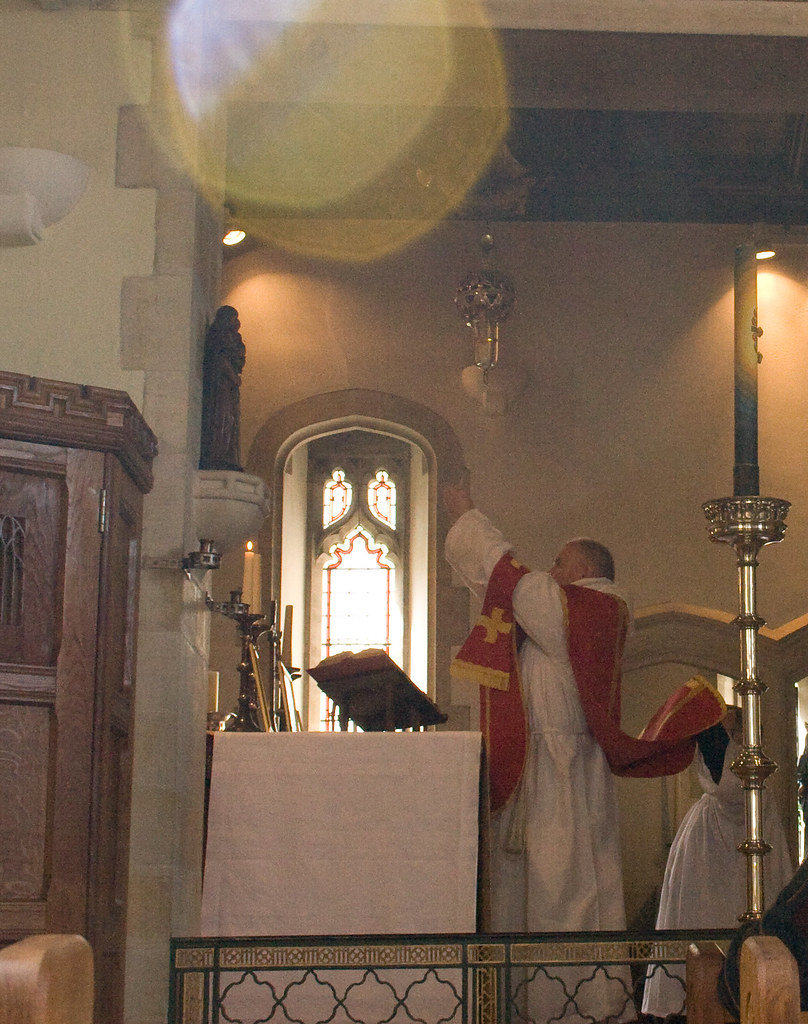
Prinknash is a continuation of the Caldey Island community, a group of Anglican monks who became Catholic en masse in 1913. (There are still monks on Caldey, but these are Cistercians who took over the buildings after the earlier community had been forced sell up: there is even an LMS pilgrimage to the island, which had a monastery on it in the Middle Ages).
The Caldey community was a favourite retreat for Mgr Ronald Knox in his Anglican days - he converted not long after they did. As Anglicans they had endless problems with the hierarchy: being a 'Catholic' Anglican before the Great War was a dangerous game. Knox quotes a friend as saying the 'a stranger listening to the conversation [at Caldey] might have imagined "bishops" to the name applied to some secret band of criminals.' (A Spiritual Aeneid, p70).
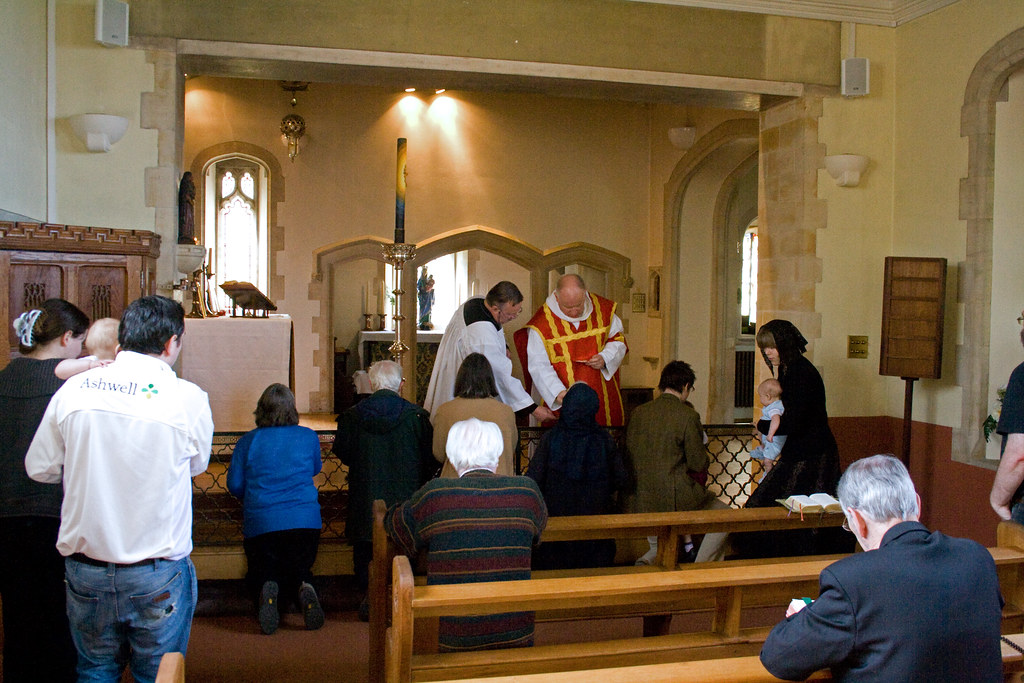
Like many English religious communities, the monks of Prinknash had a period of enormous growth in the mid 20th Century, which came to an abrupt end in the 1970s. At the end of that time they built a new monastery, complete with Abbey Church, and turned the old one into a guest house. A couple of years ago they moved out of the 1970s building and back into the old monastery, and it was in the old chapel that Mass took place. The 'new' monastery is now derelict - from an architectural point of view it is not a great loss.
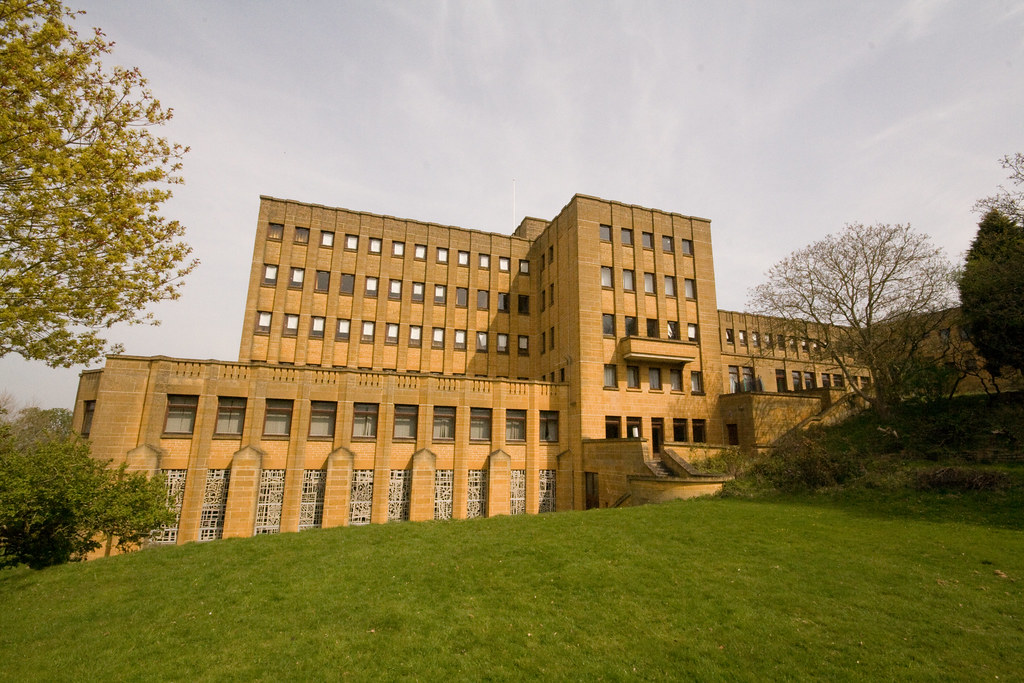
 At Mass we met up with the LMS Rep from Birmingham, Matthew Doyle, and the assistant rep for Cheltenham, Damian Barker, for a picnic lunch. We ended up staying all afternoon, looking at the extensive 'Bird Park', which also houses tame deer, goats, ponies and much else. It is a lot of fun with small children, and I recommend it. It is best to take plenty of 20p coins, since these release portions of food for the different kind of animal you encounter.
At Mass we met up with the LMS Rep from Birmingham, Matthew Doyle, and the assistant rep for Cheltenham, Damian Barker, for a picnic lunch. We ended up staying all afternoon, looking at the extensive 'Bird Park', which also houses tame deer, goats, ponies and much else. It is a lot of fun with small children, and I recommend it. It is best to take plenty of 20p coins, since these release portions of food for the different kind of animal you encounter.
There are a few more photos here.
Saturday, April 24, 2010
Mass at Prinknash Abbey
Tuesday, April 20, 2010
Server Training Day and launch of Servers' Sodality
I posted before on the 'Master Class' we are having for altar servers; this is taking place on Saturday 15th May, in Blackfriars, starting at 11.30. Contact me if you would like to come.
On the same occasion the Latin Mass Society will be launching a new sodality for those who serve the Traditional Mass, or want to learn:
The Society of St Tarcisius (website)
This will be a sodality under the leadership of the Latin Mass Society's National Chaplain; the Secretary will be David Forster. Email him to join.
The objects of the Society are to be:
1. To promote the dignified, devout, and accurate service of the altar in the traditional Roman rite.
2. To promote the spiritual formation of altar servers, in the spirit of St Tarcisius, who accepted death rather than allow the profanation of the most holy sacrament.
3. To disseminate information on the correct service of the altar, and arrange from time to time training events for servers.
4. To maintain a list of those who are willing and able to serve at the traditional liturgy, and provide this information to those organizing traditional events, where needed.
The Society is specifically committed to the traditional Latin liturgy of the Catholic church, in a form no later than that promulgated in 1962.
Membership
1. Full membership will be open to any Catholic boy or man who is able correctly and devoutly to serve low mass in the traditional rite. Where applicants for membership are not known to the secretary, the signature of an existing member, or of a priest, that this condition is fulfilled is needed.
2. Those not yet able to fulfil the requirement for full membership may be admitted as probationary members.
1. To promote the dignified, devout, and accurate service of the altar in the traditional Roman rite.
2. To promote the spiritual formation of altar servers, in the spirit of St Tarcisius, who accepted death rather than allow the profanation of the most holy sacrament.
3. To disseminate information on the correct service of the altar, and arrange from time to time training events for servers.
4. To maintain a list of those who are willing and able to serve at the traditional liturgy, and provide this information to those organizing traditional events, where needed.
The Society is specifically committed to the traditional Latin liturgy of the Catholic church, in a form no later than that promulgated in 1962.
Membership
1. Full membership will be open to any Catholic boy or man who is able correctly and devoutly to serve low mass in the traditional rite. Where applicants for membership are not known to the secretary, the signature of an existing member, or of a priest, that this condition is fulfilled is needed.
2. Those not yet able to fulfil the requirement for full membership may be admitted as probationary members.
3. Others who wish to do so may join as supporters.
Membership is on application to the secretary.
It is not intended that there should be any fee or subscription for membership.
Membership is on application to the secretary.
It is not intended that there should be any fee or subscription for membership.
St Tarcisius was carrying the Blessed Sacrament to Christian prisoners during a persecution in 3rd Century Rome, when he was set on by a mob. Refusing to give up the Blessed Sacrament he was holding, they stoned him to death. Here's his Wikipedia entry.
Saturday, April 17, 2010
Pictures of Ushaw 2010
There are lots of pictures already up from Fr Brown at Forest Murmers (there's also some commentary from our Leeds Representative, who was there; I took these during the last two days, when I was there.
You don't have to be an archaeologist to see what kind of liturgy Ushaw was built for.
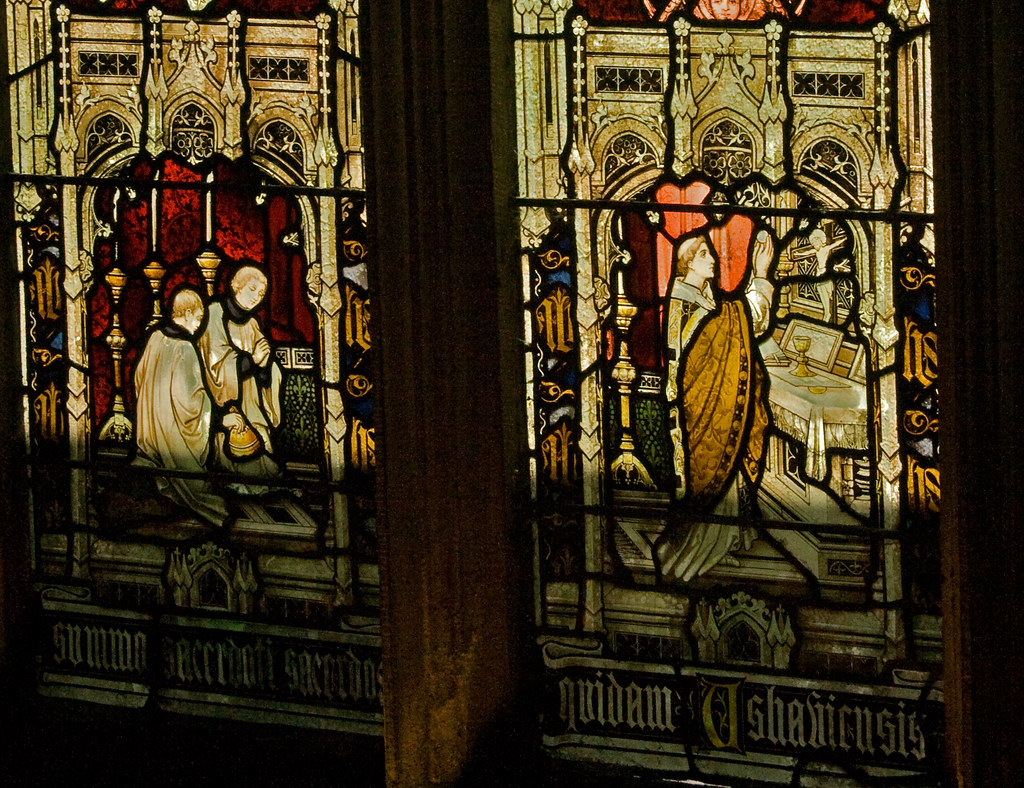
The first thing I was able to attend was Vespers and Benediction on Thursday - notice the enormous monstrance on its throne above the High Altar in St Cuthbert's Chapel, where the crucifix normally stands.
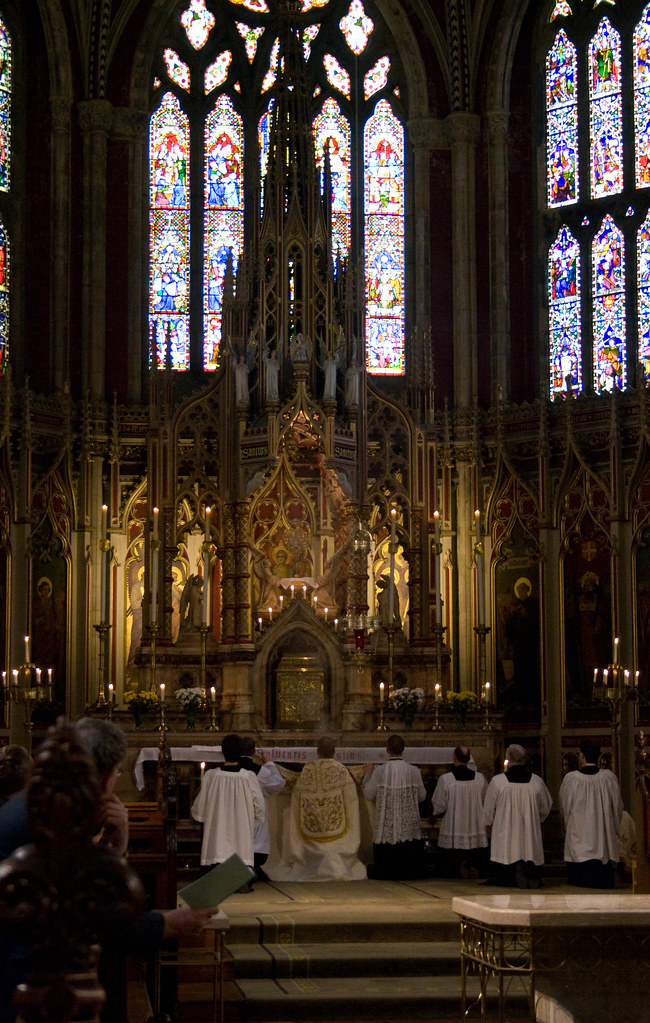
This was followed by the Conference Dinner, at which we had speeches, including a very interesting reminiscence from Fr Elkin, who had attended Ushaw as a boy and a seminarian in the 1950s. He told us the place was infested with rats, so not all the changes since then have been negative! The junior seminary has long gone, and instead of 400 students they now have a total of 24 seminarians. Fr Elkin, who has been a long-term supporter of the Traditional Mass, summed up by saying that 'our future lies in the past'. He got a standing ovation.
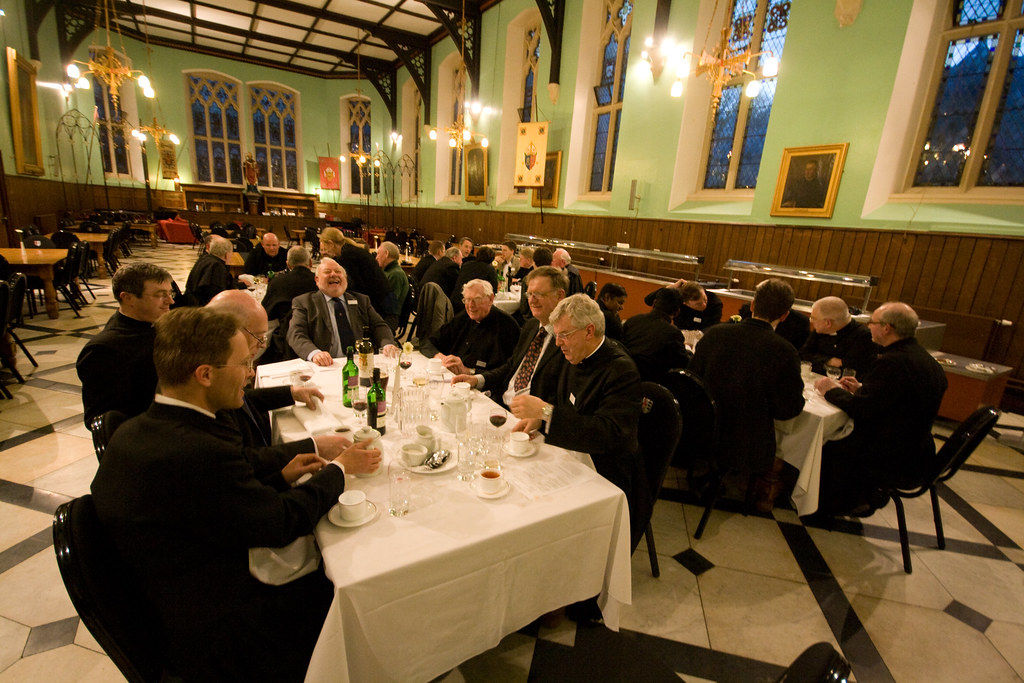
Early the next morning the priests were saying their private Masses, which is always a wonderful thing to see, on the numerous tiny chapels intended for this purpose but little used since the liturgical reform. These chapels are exquisite. This one below was unusable last year, because it was being used to store a drum kit.
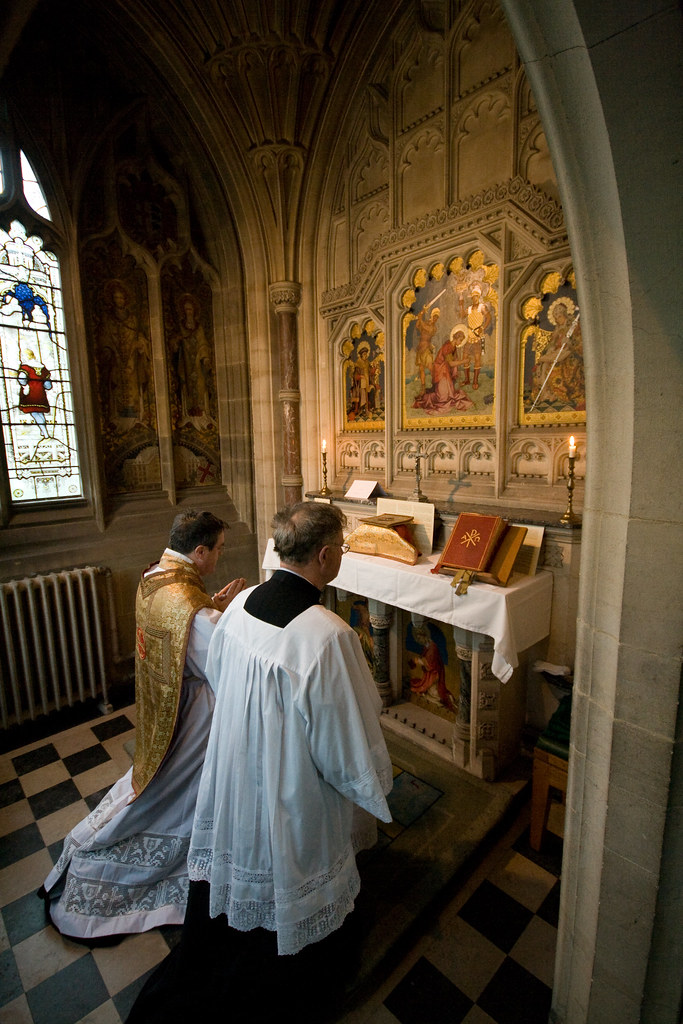
This was followed by Lauds, which was supported by a liturgical schola led by Mike Forbester. The size of the chapel means that you need a good number of singers for it to work well.
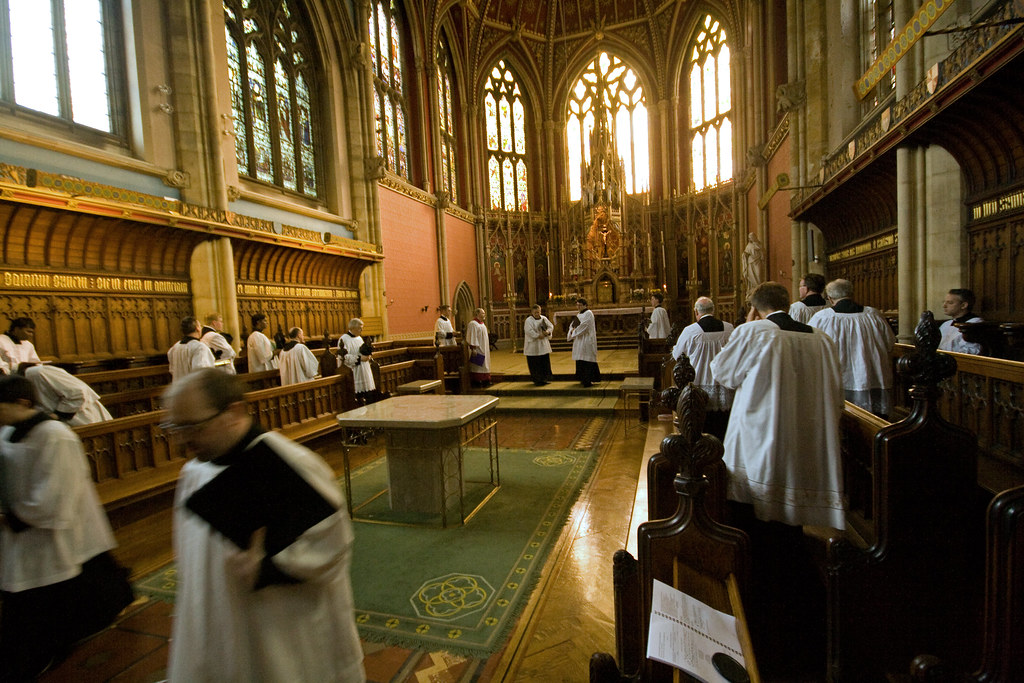
This was followed by an open forum for discussion of how the conferences should be developed. From this, and from other conversations, it was very evident how much the conferences are apreciated both for the knowledge of the Traditional Mass they impart but also for the social aspect. They are a great boost to morale for the priests, who often feel rather isolated in their dioceses, but through the conferences and similar events (such as Fr de Malleray's retreats for priests) are establishing a network of like-minded priests.
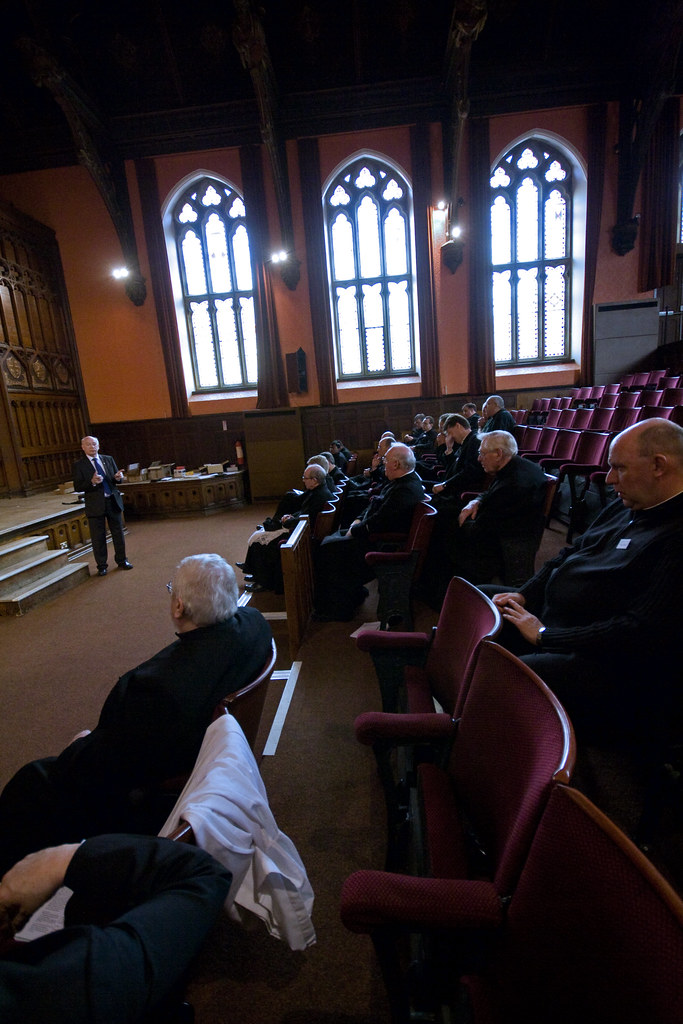
Several reiterated the point made, about the London Colney Conference last autumn by the Catholic Herald's 'Pastor Iuventus', that meeting other traditionally-minded priests at these events shatters the negative stereotype which was fixed in their minds - the other priests interested in the Old Mass are not weirdos, fanatics, political extremists or liturgical obsessives. They are perfectly normal and sane. Clearly, as this fact gradually gets out, more priests will be inclined to attend.
This was followed by a splendid Solemn Mass, a votive Mass in honour of the Patron of Ushaw, the great St Cuthbert, which was accompanied by both a liturgical schola and polyphonic choir.
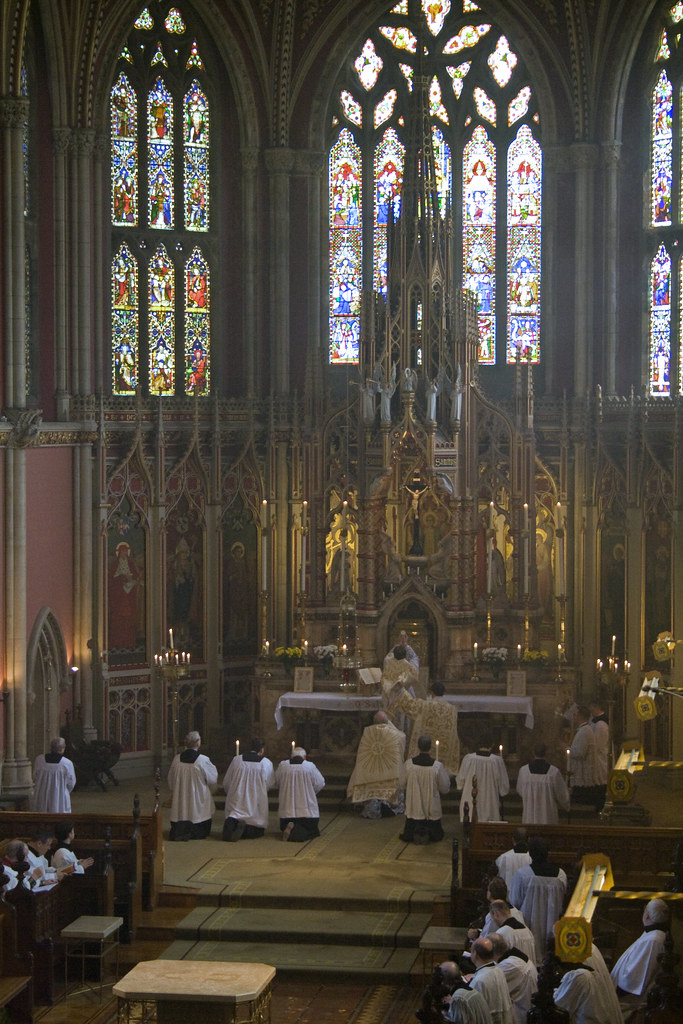
It became harder to get good photos from the loft where I was stationed, as the sanctuary filled with ever-denser incense!
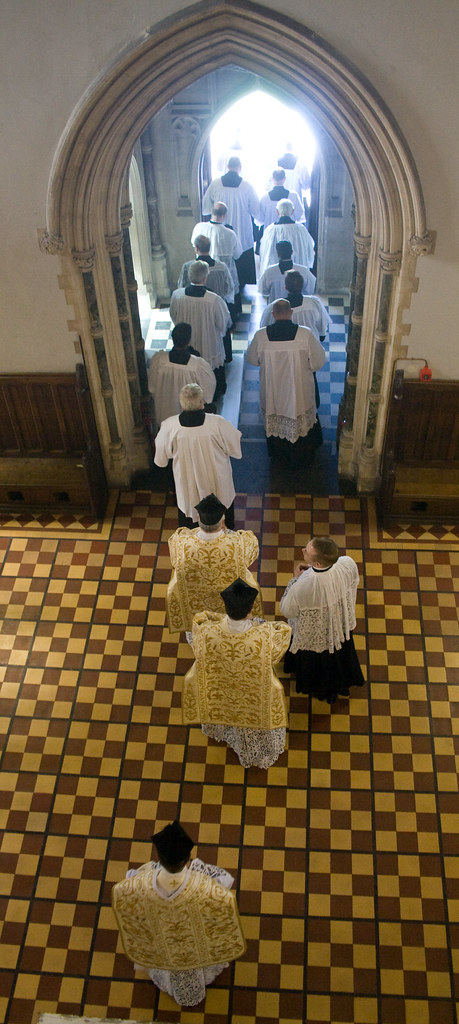
The priests taught at this conference go out into the world - into their parishes across England and Wales, in some cases into Scotland. We also had a delightful South African priest, and two charming young priests were sent to us personally by Archbishop Ranjith of Columbo, Sri Lanka - better known from his days at the Congregation for Divine Worship in Rome.
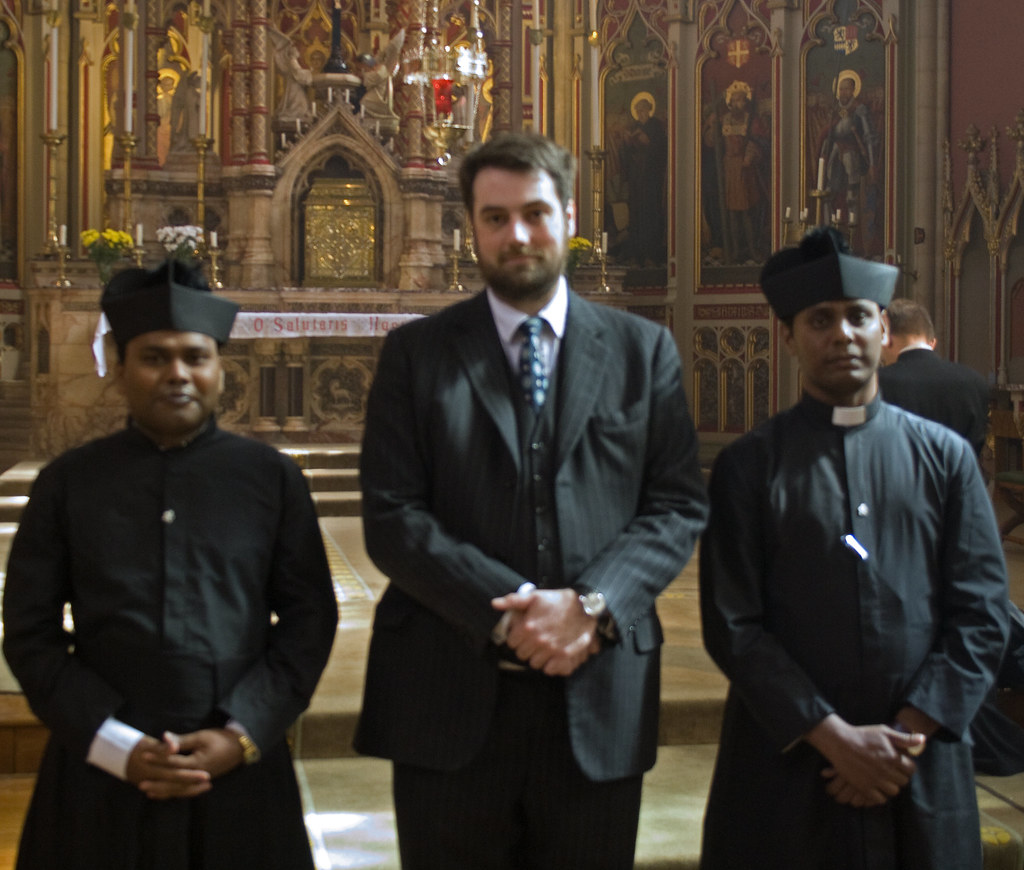
Archbishop Ranjith sent us, by them, a very thoughtful letter of support and encouragment, which was read out at the Conference Dinner.
These Conferences are always inspiring occasions, and this was no exception. It is truly wonderful to think of the 75 priests now saying the Traditional Mass thanks to previous conferences; as time goes on these will have an exponential effect, as they influence, and even train, other priests in their areas, young men interested in the priesthood, and the faithful. The fruits of the Motu Proprio are there to see.
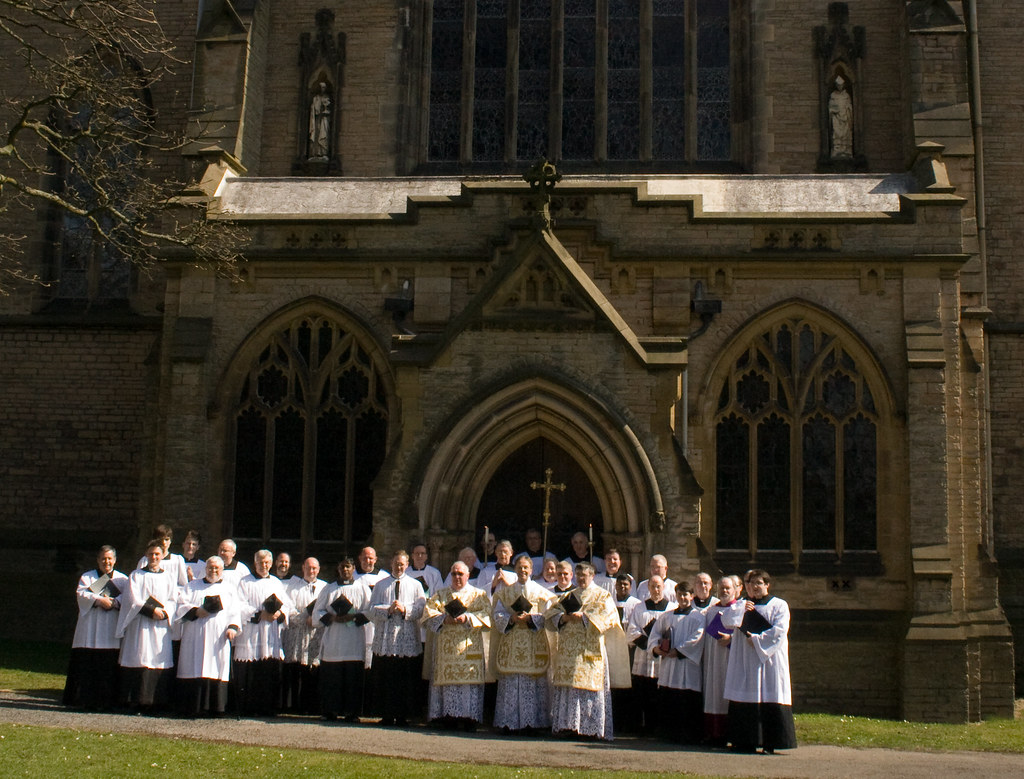
Slideshow of my photos here; see the set here.
You don't have to be an archaeologist to see what kind of liturgy Ushaw was built for.

The first thing I was able to attend was Vespers and Benediction on Thursday - notice the enormous monstrance on its throne above the High Altar in St Cuthbert's Chapel, where the crucifix normally stands.

This was followed by the Conference Dinner, at which we had speeches, including a very interesting reminiscence from Fr Elkin, who had attended Ushaw as a boy and a seminarian in the 1950s. He told us the place was infested with rats, so not all the changes since then have been negative! The junior seminary has long gone, and instead of 400 students they now have a total of 24 seminarians. Fr Elkin, who has been a long-term supporter of the Traditional Mass, summed up by saying that 'our future lies in the past'. He got a standing ovation.

Early the next morning the priests were saying their private Masses, which is always a wonderful thing to see, on the numerous tiny chapels intended for this purpose but little used since the liturgical reform. These chapels are exquisite. This one below was unusable last year, because it was being used to store a drum kit.

This was followed by Lauds, which was supported by a liturgical schola led by Mike Forbester. The size of the chapel means that you need a good number of singers for it to work well.

This was followed by an open forum for discussion of how the conferences should be developed. From this, and from other conversations, it was very evident how much the conferences are apreciated both for the knowledge of the Traditional Mass they impart but also for the social aspect. They are a great boost to morale for the priests, who often feel rather isolated in their dioceses, but through the conferences and similar events (such as Fr de Malleray's retreats for priests) are establishing a network of like-minded priests.

Several reiterated the point made, about the London Colney Conference last autumn by the Catholic Herald's 'Pastor Iuventus', that meeting other traditionally-minded priests at these events shatters the negative stereotype which was fixed in their minds - the other priests interested in the Old Mass are not weirdos, fanatics, political extremists or liturgical obsessives. They are perfectly normal and sane. Clearly, as this fact gradually gets out, more priests will be inclined to attend.
This was followed by a splendid Solemn Mass, a votive Mass in honour of the Patron of Ushaw, the great St Cuthbert, which was accompanied by both a liturgical schola and polyphonic choir.

It became harder to get good photos from the loft where I was stationed, as the sanctuary filled with ever-denser incense!

The priests taught at this conference go out into the world - into their parishes across England and Wales, in some cases into Scotland. We also had a delightful South African priest, and two charming young priests were sent to us personally by Archbishop Ranjith of Columbo, Sri Lanka - better known from his days at the Congregation for Divine Worship in Rome.

Archbishop Ranjith sent us, by them, a very thoughtful letter of support and encouragment, which was read out at the Conference Dinner.
These Conferences are always inspiring occasions, and this was no exception. It is truly wonderful to think of the 75 priests now saying the Traditional Mass thanks to previous conferences; as time goes on these will have an exponential effect, as they influence, and even train, other priests in their areas, young men interested in the priesthood, and the faithful. The fruits of the Motu Proprio are there to see.

Slideshow of my photos here; see the set here.
Friday, April 16, 2010
Happy Birthday Holy Father from the LMS Priest Training Conference!
Today is Pope Benedict's birthday, and the last day of the LMS Priest Training Conference in Ushaw. More than 20 priest participants, their priest tutors, plus servers and singers, processed out of the breathtaking Chapel of St Cuthbert after a glorious Solemn Mass, singing the Te Deum.

At lunch I offered a toast to the Holy Father and we sang Happy Birthday in high spirits.
I joined the conference for the final 24 hours, and I will be posting proper pictures when I get home. It has been another great occasion for the priests and all involved.
-- Post From My iPhone

At lunch I offered a toast to the Holy Father and we sang Happy Birthday in high spirits.
I joined the conference for the final 24 hours, and I will be posting proper pictures when I get home. It has been another great occasion for the priests and all involved.
-- Post From My iPhone
Monday, April 12, 2010
St Catherine's Trust Family Retreat: report and photos

Mass in the New Chapel
The St Catherine's Trust Family Retreat ran from 9-11th April; this was our fifth, the first being in Spring 2006, following the first ever SCT Summer School in 2005. We felt that there was a huge unmet need for spiritual support of Catholic families attached to the Traditional Mass, many of whom have very unsatisfactory liturgical lives - travelling long distances to Sunday Masses, sometimes in different places each week, or not being able to get to the Traditional Mass regularly at all. Our instinct was correct, and the Family Retreat - priced to accomodate the greatest possible range of people, with children coming for free - has been a great success over the years. This year we were in a new venue, the Oratory School in Oxfordshire, near the village of Woodcote between Oxford and Reading. The 2010 Retreat hosted a Chant course as well, about which I've written a separate blog post on the Gregorian Chant Network blog.
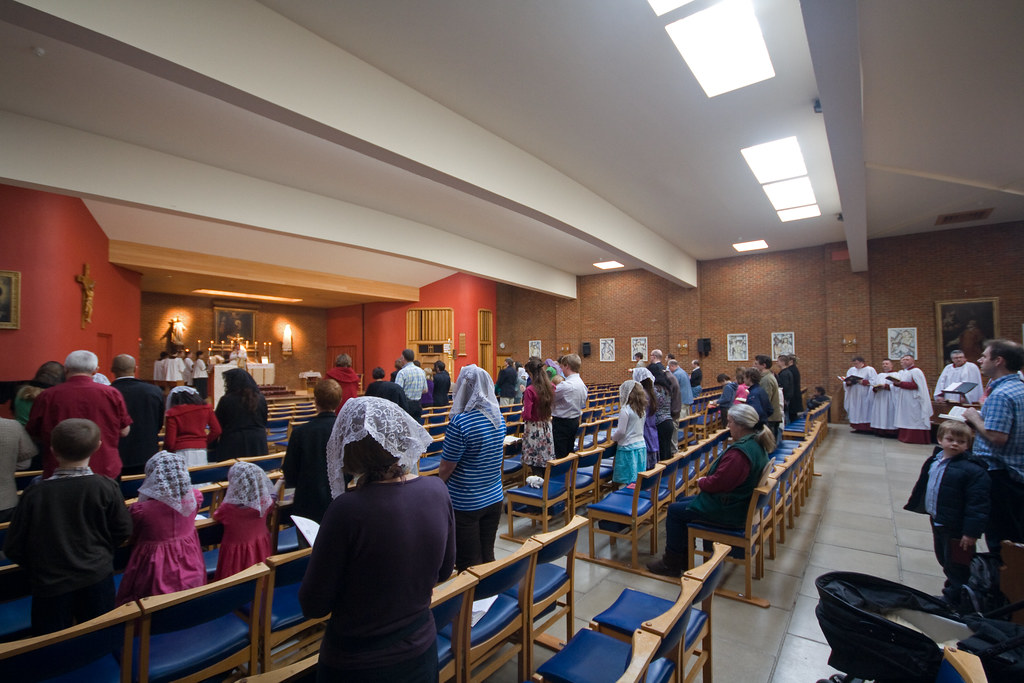
The Oratory School is a Catholic school with two chapels, both arranged for ad orientem Mass thanks to the school's Chaplain, the long-standing LMS National Chaplain Fr Anthony Conlon, who retired from that post last year.

A Statue of Our Lady is carried in procession through the School grounds.
The Family Retreat is designed to enable parents of children of all ages to attend with the maximum spiritual benefit. There are activities for children of all ages during the adults' talks, and our Retreat Giver, Fr Andrew Southwell, always gives a spiritual talk to the children as well. This year the younger children made small Marian banner for the Marian procession which we had around the grounds of the school, from one chapel to the other; they also had an Easter Egg hunt.

Prayers at the end of the Procession, in the Old Chapel.
Fr Southwell was assisted by Fr Thomas Crean OP who spent much time in the confessional.

Bookstall supplied by Southwell Books.
In addition to Sung Mass on each of the three days, we had Rosary each day and Compline on Friday, and Vespers and Benediction as well as Compline on Saturday. The Marian procession, in glorious sunshine and in the lovely surroundings of the school grounds, was a new feature, and was very moving. We had small girls scattering petals before the statue, which was preceeded by a thurifer and four torchbearers, and followed by our two priests, Fr Southwell in a cope with an MC, and then the retreatants and singers, more than 150 people in total.
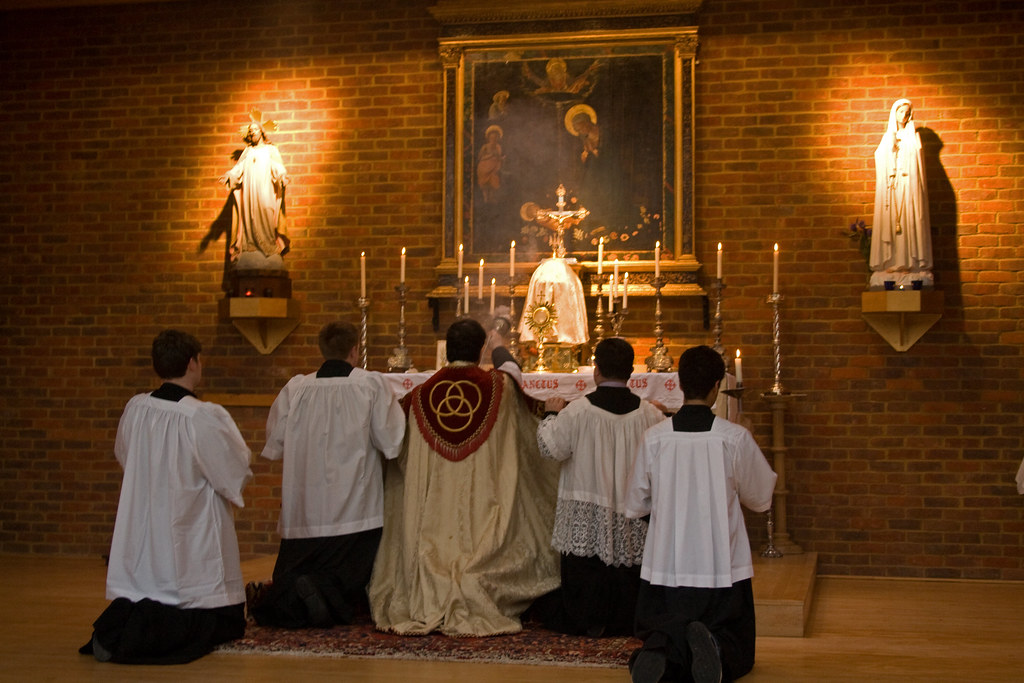
Benediction of the Blessed Sacrament,
See a slideshow of the photographs.
Retreat & Chant course completed
The St Catherine's Trust Family Retreat finished yesterday, and I'm now recovering! There were 150 people, including 30 singers attending the first training event of the Gregorian Chant Network, directed by Nick Gale.

It took place at the Oratory School in Oxfordshire Photos, videos and more to come!
-- Post From My iPhone

It took place at the Oratory School in Oxfordshire Photos, videos and more to come!
-- Post From My iPhone
Saturday, April 10, 2010
The BBC's otrageous bias
The BBC informs us:
"In the letter, Cardinal Ratzinger - who was at the time the head of the Congregation for the Doctrine of the Faith, which has responsibility for tackling abuse by clerics - said the "good of the universal Church" needed to be considered in any defrocking, AP reported."
http://news.bbc.co.uk/1/mobile/world/europe/8612787.stm
The hostility needed to turn this non-event into a story attacking the Holy Fsther is staggering. So he WAS head of the CDF, which IS responsible for the cases - and became responsible 6 years after this letter was written!
So he wrote a letter pointing out the good of the Church must be considered? If this were a smoking gun then they might have quoted it, but but they don't even link to it. Does that constitute 'resisting' the de-frocking, which happened a couple of years later, in a wrongful way? Hardly.
The BBC is paid for by British license-fee payers. Not by me - I haven't had a telly for several years now. It's time more people realised how aggressively anti-Catholic the BBC has become.
-- Post From My iPhone
"In the letter, Cardinal Ratzinger - who was at the time the head of the Congregation for the Doctrine of the Faith, which has responsibility for tackling abuse by clerics - said the "good of the universal Church" needed to be considered in any defrocking, AP reported."
http://news.bbc.co.uk/1/mobile/world/europe/8612787.stm
The hostility needed to turn this non-event into a story attacking the Holy Fsther is staggering. So he WAS head of the CDF, which IS responsible for the cases - and became responsible 6 years after this letter was written!
So he wrote a letter pointing out the good of the Church must be considered? If this were a smoking gun then they might have quoted it, but but they don't even link to it. Does that constitute 'resisting' the de-frocking, which happened a couple of years later, in a wrongful way? Hardly.
The BBC is paid for by British license-fee payers. Not by me - I haven't had a telly for several years now. It's time more people realised how aggressively anti-Catholic the BBC has become.
-- Post From My iPhone
Tuesday, April 06, 2010
Easter Vigil with the FSSP in Reading
Here are my pictures of the Easter Vigil. Fr de Malleray was celebrant, Fr Leworthy deacon, and Mr Grabowski subdeacon.
Numbers were excellent, and the schola and the ceremonies alike were the best ever acheived with the Fraternity apostolate in Reading. This may not sound much of a boast, but these Triduum services began only five years ago in Christ the King in Reading with Fr Nicholas du Chaxel FSSP, with extremly stretched singing and serving resources. We aren't perfect now, but the singing was more than respectable, with an eleven-strong schola each day, and you can see the large serving team. We are extremely fortunate to have the committment of the Fraternity to Reading, allowing these things to be built up over time, as is necessary.
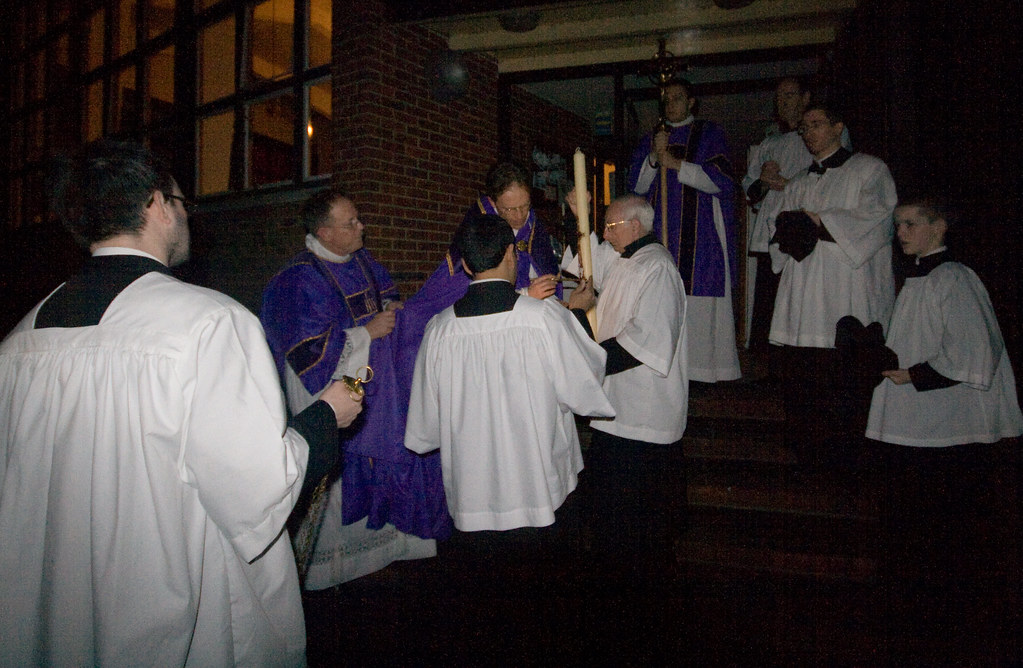
The church by candlelight.

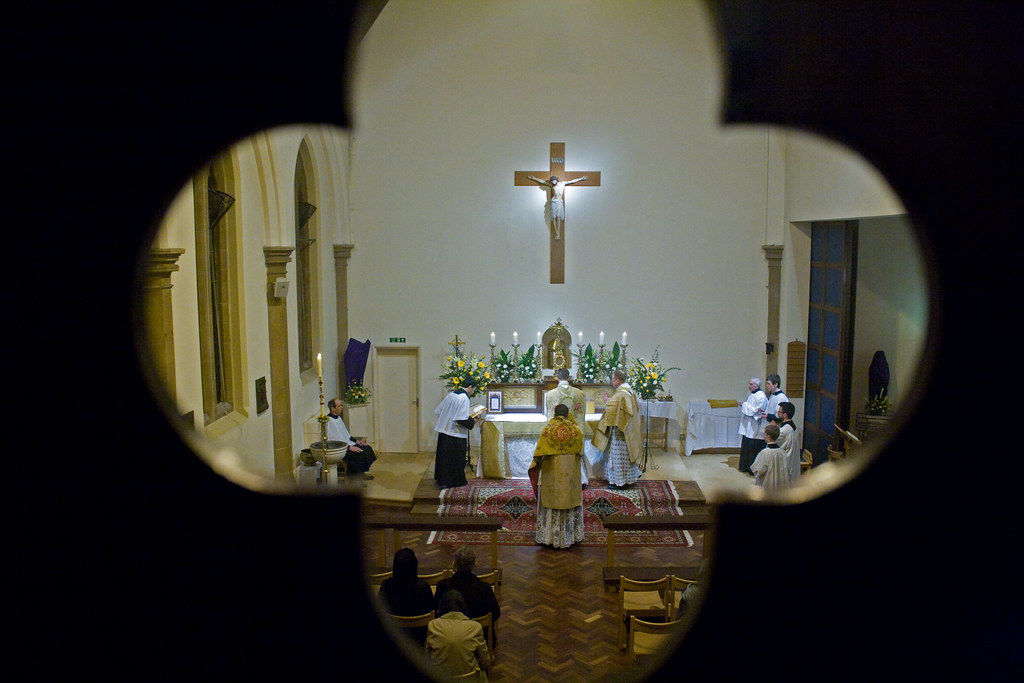
The whole set of photos is here, a slideshow here.
Numbers were excellent, and the schola and the ceremonies alike were the best ever acheived with the Fraternity apostolate in Reading. This may not sound much of a boast, but these Triduum services began only five years ago in Christ the King in Reading with Fr Nicholas du Chaxel FSSP, with extremly stretched singing and serving resources. We aren't perfect now, but the singing was more than respectable, with an eleven-strong schola each day, and you can see the large serving team. We are extremely fortunate to have the committment of the Fraternity to Reading, allowing these things to be built up over time, as is necessary.

The church by candlelight.


The whole set of photos is here, a slideshow here.
Good Friday in Reading
Monday, April 05, 2010
Maundy Thursday with the FSSP in Reading
I have now processed my photographs from the Easter Triduum in Reading - and the splendid Solemn Mass which took place this morning in Dorchester. But first things first: here are photographs of the Maundy Thursday Mass in Reading.
Fr de Malleray was the celebrant, and Fr Leworthy deacon; they were joined by a Polish FSSP seminarian, the Rev Mr Marek Grabowski, from Wigratzbad, who was subdacon. (He really is a sub-deacon: he will be ordained deacon this year. He also taught at the St Catherine's Trust Summer School in 2007.) Also present was another FSSP seminarian, Ian Verrier, and Englishman, from Denton, who is an excellent organist. Last year he was with us in lay clothes; he has now received the cassock.
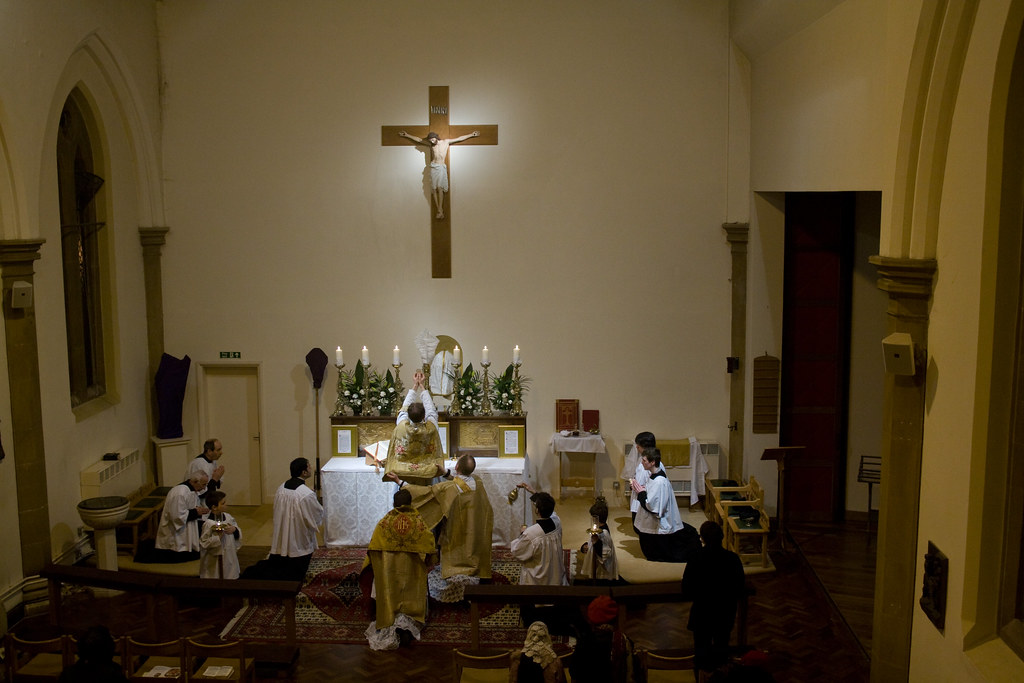
The Blessed Sacrament is taken to the Altar of Repose.
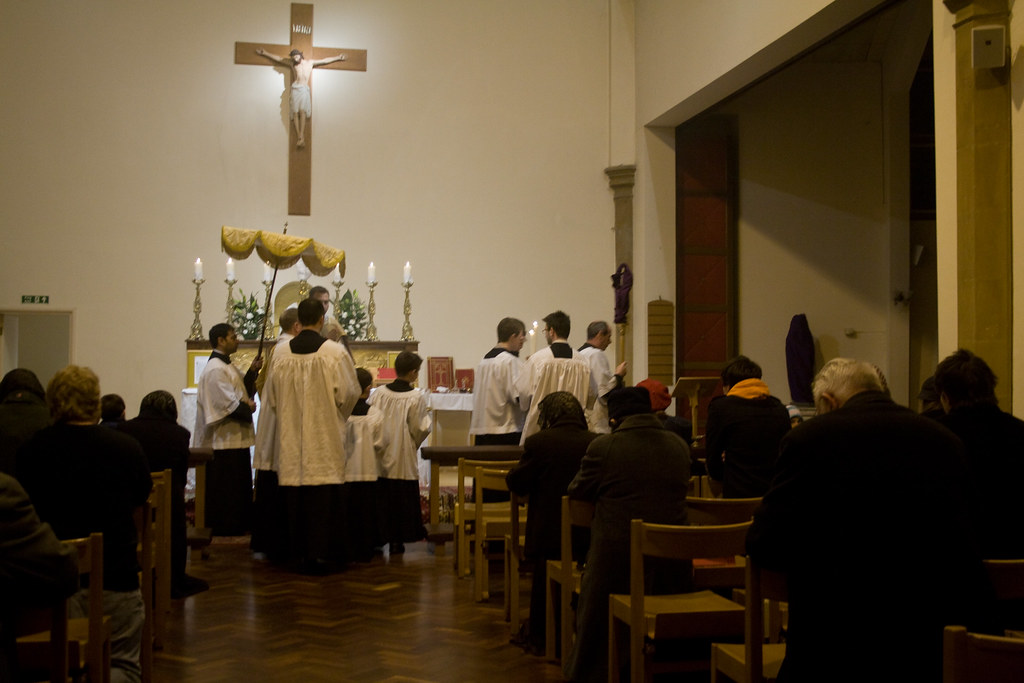

You can see the full set of photographs here, and a slideshow here.
Fr de Malleray was the celebrant, and Fr Leworthy deacon; they were joined by a Polish FSSP seminarian, the Rev Mr Marek Grabowski, from Wigratzbad, who was subdacon. (He really is a sub-deacon: he will be ordained deacon this year. He also taught at the St Catherine's Trust Summer School in 2007.) Also present was another FSSP seminarian, Ian Verrier, and Englishman, from Denton, who is an excellent organist. Last year he was with us in lay clothes; he has now received the cassock.

The Blessed Sacrament is taken to the Altar of Repose.


You can see the full set of photographs here, and a slideshow here.
Bishop Hollis retiring this year?
Sunday, April 04, 2010
Christians' rights
While recovering from the Easter Triduum - in my case, getting home at 3am from the FSSP church in Reading this morning - I was interested to read a blog post re-tweeted by Fr Finigan: http://bit.ly/alUMEK
It is always interesting to see atheists and gay activists defending the rights of Christians: Peter Tatchell now seems worried that freedom of speech is being lost by the homophobia legislation. This chap Neil Midgley is concerned about property rights: why should B&B owners have to welcome gay couples into their homes?
Perhaps Tatchell has created a monster he can't control. But as I've said on this blog before, these kinds of arguments don't work. No one is going to take any notice of them because they don't cohere with some basic assumptions of the debate, the assumptions of what we might call the 'liberal argument'.
The point of the homophobia and equality legislation is to protect each individual in his pursuit of whatever conception of the good he chooses to have. For him to be able to make this pursuit, which is a private quest if you like, others' liberties must be curtailed: people must not kill him, steal from him etc.. Systematic discrimination against him would stop his quest as effectively as systematic physical attacks, so it must be prohibited in the same way and for the SAME REASON. The basis of morality is the individual's pursuit of his conception of the good; what impedes this is bad, what facilitates it good.
So where does freedom of expression and property rights fit in? They have no force of themselves. They were convenient slogans during the American Revolution but they aren't fundamental. The fundamental question is What impedes an individual's pursuit of his chosen conception of the good? The freedom of expression of a street preacher and the property rights of a B&B owner, if used to block the fulfilling of someone's conception of the good, must be restricted.
What of the freedom of the preacher and the property owner to pursue their own conceptions of the good? Sorry, this won't get us anywhere because these people have conceptions which involve the unjust oppression of others. They are, if you like, criminal conceptions of the good, like ones which involve torturing children.
So what should we say in defence of the preacher and the B&B owner? We need to reject something more fundamental than the application of the liberal argument to these particular cases. We need to reject the liberal argument itself.
At the core of it is the idea that if not all conceptions of te good are equally rewarding, it is at any rate more important to be free to choose one's conception than it is get make the right choice (or to be kept from making really bad choices). But once we have this out on the table, we can see it is totally implausible: no parent or teacher believes this, and the government doesn't either. The life of a drug addict, to give just one example, oppresses no-one but we are thoroughly educated and indeed coerced not to choose it. The liberal argument is based on an absurd fiction.
We can win the argument. But not on the liberals' chosen grounds.
-- Post From My iPhone
It is always interesting to see atheists and gay activists defending the rights of Christians: Peter Tatchell now seems worried that freedom of speech is being lost by the homophobia legislation. This chap Neil Midgley is concerned about property rights: why should B&B owners have to welcome gay couples into their homes?
Perhaps Tatchell has created a monster he can't control. But as I've said on this blog before, these kinds of arguments don't work. No one is going to take any notice of them because they don't cohere with some basic assumptions of the debate, the assumptions of what we might call the 'liberal argument'.
The point of the homophobia and equality legislation is to protect each individual in his pursuit of whatever conception of the good he chooses to have. For him to be able to make this pursuit, which is a private quest if you like, others' liberties must be curtailed: people must not kill him, steal from him etc.. Systematic discrimination against him would stop his quest as effectively as systematic physical attacks, so it must be prohibited in the same way and for the SAME REASON. The basis of morality is the individual's pursuit of his conception of the good; what impedes this is bad, what facilitates it good.
So where does freedom of expression and property rights fit in? They have no force of themselves. They were convenient slogans during the American Revolution but they aren't fundamental. The fundamental question is What impedes an individual's pursuit of his chosen conception of the good? The freedom of expression of a street preacher and the property rights of a B&B owner, if used to block the fulfilling of someone's conception of the good, must be restricted.
What of the freedom of the preacher and the property owner to pursue their own conceptions of the good? Sorry, this won't get us anywhere because these people have conceptions which involve the unjust oppression of others. They are, if you like, criminal conceptions of the good, like ones which involve torturing children.
So what should we say in defence of the preacher and the B&B owner? We need to reject something more fundamental than the application of the liberal argument to these particular cases. We need to reject the liberal argument itself.
At the core of it is the idea that if not all conceptions of te good are equally rewarding, it is at any rate more important to be free to choose one's conception than it is get make the right choice (or to be kept from making really bad choices). But once we have this out on the table, we can see it is totally implausible: no parent or teacher believes this, and the government doesn't either. The life of a drug addict, to give just one example, oppresses no-one but we are thoroughly educated and indeed coerced not to choose it. The liberal argument is based on an absurd fiction.
We can win the argument. But not on the liberals' chosen grounds.
-- Post From My iPhone
Friday, April 02, 2010
Oh my people, what have I done unto thee?
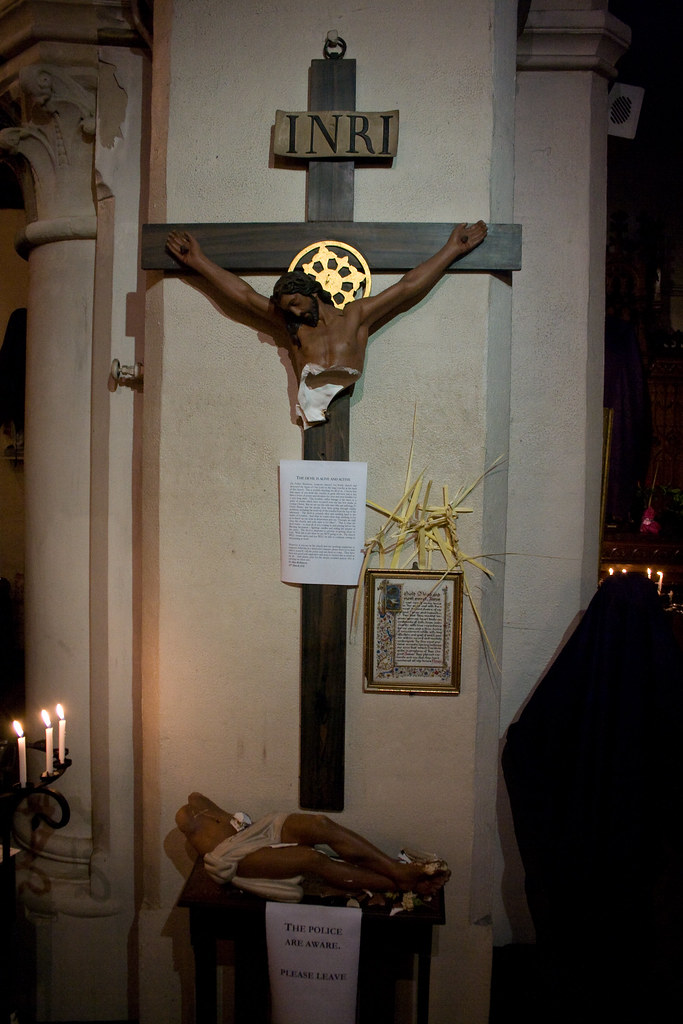
The vandalism at Maiden Lane has been reported elsewhere, but I visited the church myself on Monday.
As is the custom on a Monday evening, there was a missa cantata organised by the Latin Mass Society. The celebrant was Fr Briggs. Photos of the Mass here.
Subscribe to:
Posts (Atom)


